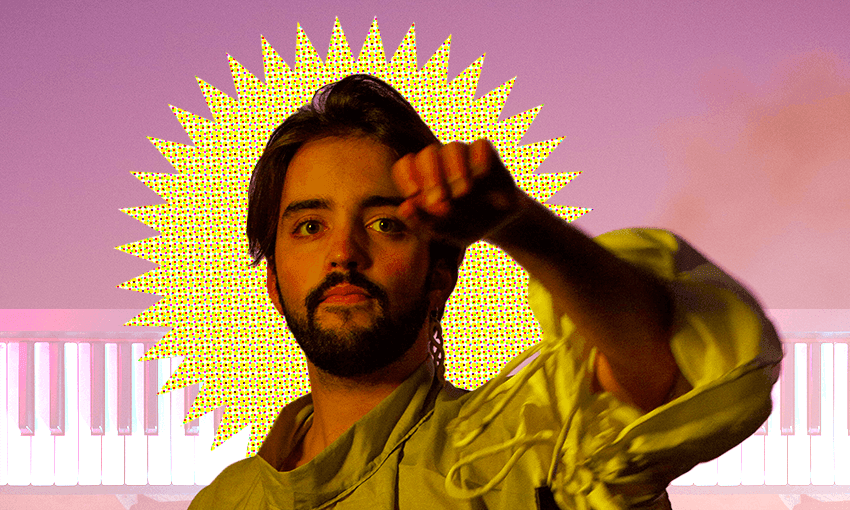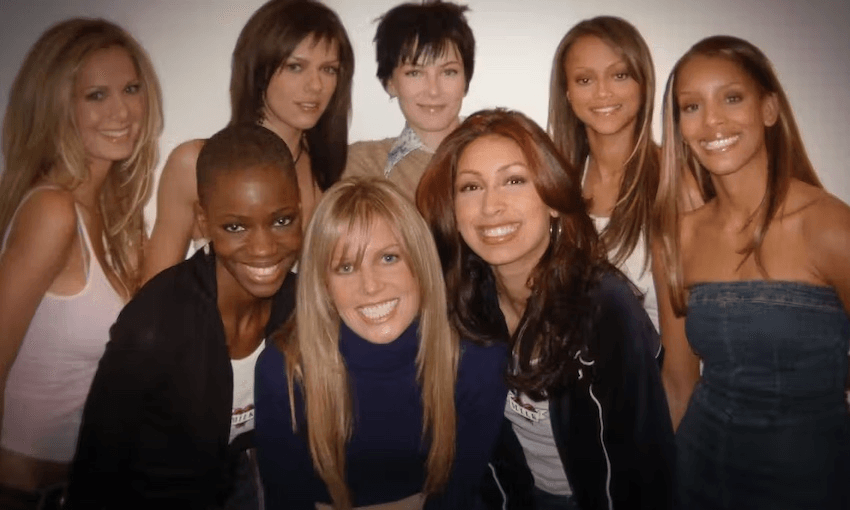This Titirangi and Te Whanganui-a-Tara musician’s work is ‘genreless’ and constantly evolving – if you’re not already a fan, you’re missing out, writes Tommy de Silva.
At my whare, the music of Arjuna Oakes blocked out the sound of howling wind during Cyclone Gabrielle. He’s one of my favourite musicians. Hailing from Titirangi, West Auckland, he’s been performing since childhood but burst onto the scene playing the keys for The Shambles. These days he performs across the motu under his own name handling the keyboard and lead vocals duties while being supported by a talented band. Arjuna is part of the “genreless generation” of musicians – the ones not allowing themselves to be shackled by one label. That’s not to say that old-school musicians never crossed categorical boundaries, but it seems more prevalent now. Being part of this genreless generation, Arjuna crosses the strict classifications of music en route to creating thoughtful, beautiful and moving mahi.
Since the Titirangi native now lives in the capital, I tracked him down for a Zoom interview. We had a thought-provoking kōrero about Arjuna’s mahi, a focus of which was this genreless form of his artwork. Arjuna told me, “genre is a great categorisation and way to understand things, but it sometimes limits the understanding and people’s perception of what music is.” To him, “music is about emotion, about expression, about feeling. And sometimes when people put all these words in front of you, it stops you from actually experiencing that.” The musicians he admires the most are those who can “transcend genre”. Although they must acknowledge their genres of inspiration, Arjuna says by transcending categories an artist can be a more honest version of themself. His inspiration is diverse, from pop, R&B, soul and jazz, to rock, folk or classical, and even Latin/South American music. When writing music, he says he doesn’t think, “I’m going to make soul today”; instead, it comes to life more naturally, reflecting what’s happening in his life and what he’s listening to. It’s no surprise, then, that Arjuna’s soundscape is so diverse.
Arjuna released his first EP, The Watcher, in 2019, recorded with a talented group of Auckland musicians. The sound of The Watcher is bathed in the smooth tones of soul, jazz and funk. Arjuna’s gorgeous vocals are on full display in this EP, as heard above in Old School Heart. I am a shit dancer, but this EP fills my gangly, uncoordinated body with an uncontrollable urge to boogie, as do the sounds of the Recovery Part 1 and Part 2 EPs. But Recovery Part 1 and 2 can’t be classified purely as soul, jazz and funk. Some songs, like, Watch the World Burn, are stylistically similar to The Watcher. But these two EPs dive deeper into Arjuna’s bag. Songs like One For and As I Am sound so different from The Watcher that you would be forgiven for thinking another artist performed them. But that’s where Arjuna’s greatness lies, the courage and skill to engage with various sounds. Given that his music reflects the events in his life, it makes sense that Recovery Part 1 and 2 are different to The Watcher. By the time he produced these EPs, Arjuna had moved to Wellington and was performing with a new band: Harrison Scholes (bass), James MacEwan (trumpet), Jo Jenkins (guitar) and Sam Notman (drums). Their live performances are art in motion, particularly when they return to their jazzy roots through improvisation.
Arjuna found a home among Wellington’s inclusive young music scene, where “all the musicians know each other, whether they’re punk musicians or jazz musicians, whatever it is… everyone jams with each other.” He’s begun collaborating with Callum Mower, who performs under the moniker Serebii. The pair have produced two EPs, First Nights and Final Days. According to their label Innovative Leisure, they share songwriting duties “with Oakes handling most of the singing and all of the keys and synths, and Mower leading the production duties and playing almost all the guitar and bass parts.” Right now, Arjuna’s Spotify top 10 is dominated by his work with Serebii, and for good reason. Their combined work is beautiful, with a dreamy, sexy, synthy sound that can’t be pigeonholed into a single or even several genres. But Arjuna’s latest work is his most ambitiously divergent project yet.
Arjuna and world-renowned Greek-New Zealand composer John Psathas released their EP Future Lullaby just before the New Year. Long gone are the soulful and funky foundations of Arjuna’s earlier works – the soothing sounds of Future Lullaby are something else entirely. Arjuna said, “the music I make with John, I’m incredibly proud of. It’s very moving”. John, a mentor and friend to Arjuna, rose to fame composing music for the 2004 Athens Olympics Games. Arjuna feels “incredibly grateful” for John’s guidance, which he told me is based on “mutual respect”. Arjuna said to me that it’s “it’s so wonderful but kind of ridiculous” that an artist as acclaimed as John treats him “like an equal” because, after all, “I’m just a kid”. But with his awe-inspiring, majestic musicianship, 24-year-old Arjuna rightly deserves not only John’s respect but that of the whole of Aotearoa.
Arjuna Oakes continues to improve his craft and evolve his sound, and he deserves Aotearoa’s attention and support. Although his music sounds equally gorgeous online or on vinyl, he is a natural performer who is at his best in front of a crowd. To see him in his element, keep an eye out for his 2023 shows before he heads overseas later this year. Arjuna will be playing at the Last Stand festival in Titirangi (Auckland) this April, and performing with John Psathas and the New Zealand Symphony Orchestra in Wellington in June.
Keep an ear open for Arjuna’s next projects, too, including his debut album and a collaborative project with Wellington’s Gallery Orchestra led by Leah Thomas. I already know I’ll be listening to these and all his other future releases on repeat.



